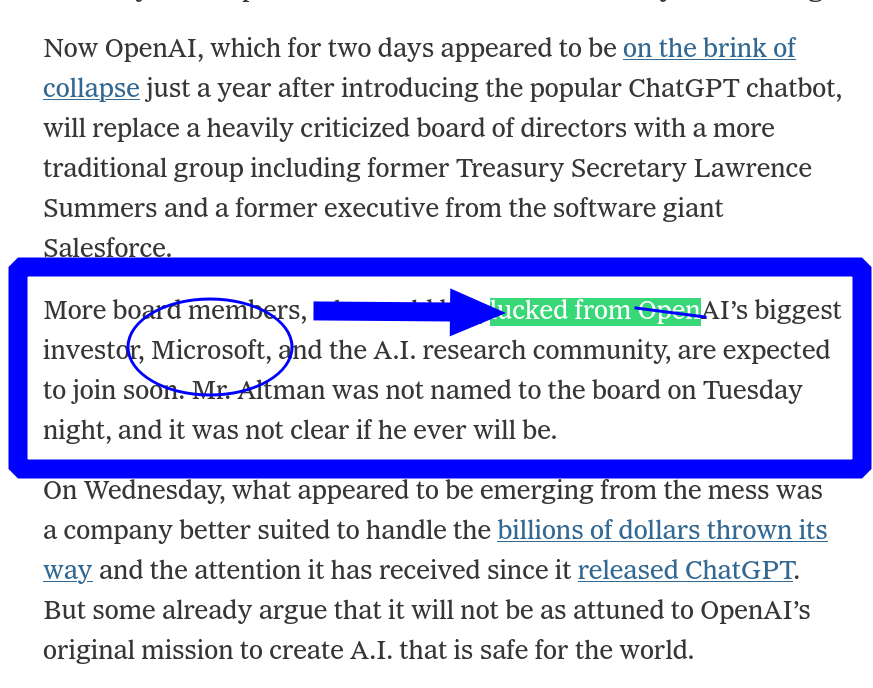Musical Chairs Melodrama and 'Extinction' BS (Sensationalist Doomsday Scenarios) Help Distract From What Chatbots Are Truly About: Plundering Other People's Work by Automated Plagiarism
Whose side are you on?
Works of art, visual and textual (also audio; multimedia at large), are being raided and they tell us it's "AI" or "GAI" when it is in fact "CG" - hardly a new thing. Creative people are vulnerable to CG, like painters versus photography. But the corporations don't innovate, they just raid and remove ownership/attribution indicators. They pretend it's some revolutionary and innovative thing when in fact the main 'breakthrough' is more computer resources thrown at the task, even if that means billions of dollars/euros wasted on hardware bills and electricity (really bad for the planet). The economic and environmental perils aside, this is not "intelligence" but just a lot of automation and abuse of artists/creators, whose works are being exploited (not merely leveraged, to note the politer term) to create obfuscated derivatives of dubious quality. It's done en masse to challenge a decryption of original sources.
Companies like Microsoft mislead public officials and judges, basically subjecting them to paid-for media "psy-ops", intentionally mis-characterising what's happening and hype it all up. Microsoft even bribes the OSI (and others) to play along with false narratives and help justify an attack on the GPL (or copyleft in general).
Let's just face it: "HEY HI" (AI) is a bubble, a misnomer in most contexts (chatbots are not AI), and nothing but a pile of debt meant to impress gullible shareholders. A new article explains (just hours ago): "After burning through $48m of Microsoft funding, the innovative AI platform developed by New York tech firm Nautilus Labs has been bought out by Danish technology provider Danelec" (simply because it ran out of cash; it's more like they just took over the staff and there's a term for this).
They also called themselves "Nautilus", which is hard to ignore. Does GNOME mind? Microsoft loves hijacking and then destroying the brands of the main rivals. Maybe the magician in charge of the GNOME Foundation has something to say about that...
Maybe not.
Anyway, the above shows how Microsoft basically takes over companies that it later claims "prove" that Microsoft is "leader" in this "HEY HI" thing (while it lays off tens of thousands of workers and goes very debt into unprecedented debt).
What about "Open" (proprietary actually) "HEY HI", the hyped up cash burner that seems to have no future? It has been personified in order to make up for its total lack of business prospects.
Who runs that company after the latest coup? We saw some names of board members and filed some of that in recent Daily Links. But it seems to be work in progress, as the turmoil isn't over yet.
There are meanwhile nerds who are complaining about the media noise [1] or obsession with overhyped losers, whose main accomplishment is losing a lot of shareholders' money in a failing company heading towards bankruptcy.
One person sent us this link that says: "More board members, who could be plucked from OpenAIs [sic] biggest investor, Microsoft, and the A.I. research community, are expected to join soon. Mr. Altman was not named to the board on Tuesday night, and it was not clear if he ever will be."
Is there a complete list or is the roster a long way from its final state?
Readers, do let us know if you see a full list of board members (the latest, not the old).
Here's the relevant bit from the article:

In my personal opinion, all this drama and "extinction" predictions serve to distract from what we described in the first paragraph. "The chatbots could accelerate extinction of civilization through overwhelming automated disinformation in all channels on all topics," an associate told me. "LLMs [chatbots] are lie machines and have nothing to do with aggregation or summarization of facts."
As Richard Stallman says (to paraphrase what he said once upon a time about clown computing), maybe I am dumb and don't get it, but to me disinformation and misinformation aren't a new thing. Scale does not guarantee audience. You can make a million versions of a lie, but each version can find an audience of one person, whereas one accurate story can reach billions of people. So I am not exceedingly worried about machine-spewed screed. That's hardly even a new problem.
Maybe chatbots are really that amazing, or maybe the emperor is naked and the media loves "skin". To me, chatbots always seemed like overhyped nonsense. I just didn't get it. I did Machine Learning code over 20 years ago and where I worked at the time we did many of the same things, also in graphics, albeit with less brute force (hence lower resolution, longer times to generate or synthesise images). I did this myself with brain images 20 years ago as a Ph.D. student. So all this "chatbots are the future" fanaticism looks to me like a bunch of clueless, delirious fake "journalists", likely handed over "prepared" articles to post for marketing purpose. The failure of the media merits another article. Many people share our feelings and observations that a lot of the news is now written by nontechnical people who resort to "HEY HI" and other meaningless nonsense, mostly to dodge any technical discussion and speak in ludicrous abstract terms, plus some click-baiting melodrama. Even if the numbers of articles did not decline, their average "worth" sank. They add nothing. Again, quantity means little. "HEY HI" is only good at quantities.
Going back to the core - and real - issue, this is the suppressed aspect we must focus on [2-4] (see below). It's the impact on copyrights. As an associate put it, "that is the core of LLMs: plagiarism [...] LLMs by their very nature generate lies, that's part of their appeal to the general business community." ("Plausible sentence generators" not "fact aggregators" or "fact summarizers")
At one point we'd like to compare board members before and after the "Open" (not!) "HEY HI" coup, but it seems like Microsoft, which already more or less controlled it, will gain even more control. We've seen some terrible journalism on this! False speculations (falsified shortly later) and worse...
"How many of the new Board of Directors at OpenAI are Microsofters," one reader asked, "especially in comparison to the old roster?"
"LLMs being marketed as AI are no more than plagiarism engines which systematically strip attribution and licensing information from copyrighted works. That seems to get lost in the soap opera about Microsoft OpenAI and Microsoft Altman."
We've already considered calling it "ElopAI" (because of the similarity to what happened to Nokia, along the lines of FSF-EEE), but most people won't 'get' it, especially young people who did not see Microsoft's destruction of Nokia from within.
The reader said that "a full list [of current board members] would be very important to know how many Microsofters got in during the shuffle."
We'll follow up once we have that information.
When Microsoft thought about hiring people from "Open" (not!) "HEY HI" - even if that didn't happen - it managed to upset loads of its own workers [5]. A self-inflicted wound. █
Related/contextual items from the news:
-
Is it safe to read tech news again?
The tech world was all a dither over one specific company and its beleaguered CEO this week, with all the suspense and intrigue of a damp sponge. Even non-technical news outlets were keen to report on what amounted to a game of musical chairs, regurgitating the same opinions and speculation.
-
Author hopes to throw the book at OpenAI, Microsoft with copyright class action
According to the complaint, Sancton spent five years and tens of thousands of dollars on the book, secure in the knowledge that the US Copyright Act gives "exclusive rights" as well as "the rights to reproduce the copyrighted work[s]."
Sancton's complaint states: "This case is about defendants OpenAI and Microsoft's complete disregard for those exclusive rights.
"Defendants [OpenAI and Microsoft] have made commercial reproductions of millions, maybe billions, of copyrighted works without any compensation to authors, without a license, and without permission.
-
OpenAI and Microsoft Face New Copyright Lawsuit for Allegedly ‘Taking the Combined Works of Humanity Without Permission’
Julian Sancton, the author of 2021’s Madhouse at the End of the Earth, only recently submitted the suit to a New York federal court. As highlighted, the case is one of several levied against OpenAI (which reinstated Sam Altman as CEO today) owing to the alleged unauthorized use of copyrighted works.
But contrasting the complaint from Sarah Silverman as well as a separate action from the Authors Guild, Sancton’s suit centers on both OpenAI and Microsoft – and not solely because the latter’s invested billions in the AI startup.
-
Microsoft, Proprietary Chaffbot Company sued over alleged unauthorized use of nonfiction authors’ work in Hey Hi (AI) training
Artificial intelligence startup Proprietary Chaffbot Company and Abusive Monopolist Microsoft Corp. have been hit with a new lawsuit alleging that the companies violated copyright monopoly by using the works of nonfiction authors to train Hey Hi (AI) models, including OpenAI’s ChatGPT.
-
Microsoft employees angered by plans to hire OpenAI staff
The announcement by Microsoft’s CTO, Kevin Scott, about hiring hundreds of OpenAI employees and matching their current compensation has sparked a wave of discontent among Microsoft workers. This decision comes at a time when many Microsoft employees have been grappling with job security concerns and increased workloads.
An employee expressed their frustration, saying, “How many loyal employees who stayed at Microsoft while working 12+ hours daily and living in constant fear of being laid off all year? Now here comes OpenAI. We worked even harder when we were told there’s no budget to hire more people. 14-hour days?” This quote captures the sentiment of several employees who feel overlooked and undervalued in the wake of the OpenAI deal.
Microsoft’s 2023 has been marked by uncertainty for its employees, with the company announcing plans in January to lay off 10,000 workers. This unease extended even to staff in cloud and AI — areas prioritized for growth. In May, CEO Satya Nadella announced a freeze on salaries and reductions in the bonus and stock award budget, exacerbating concerns about job security and compensation.

